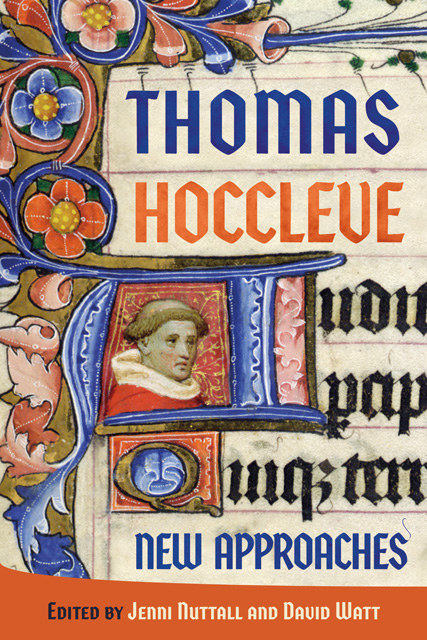6 - Hoccleve, Swelling and Bursting
Published online by Cambridge University Press: 11 January 2023
Summary
What goes out of the body, out of its pores and openings, points to the infinitude of the body proper and gives rise to abjection. (Julia Kristeva)
This essay focuses on a metaphor for emotional experience that is both entirely conventional in late medieval poetry and so reflexive and widespread as to be nearly synonymous with the experience itself: the sense that a strong emotion swells, often in the chest, until it bursts out as tears, speech, or even the act of writing. Hoccleve reproduces this metaphor throughout his poetic career, but it enjoys particular pride of place in the Series: the collection begins and ends with swelling and bursting. These moments, defined as they are by their ambivalent relationship to originality – a cliché that nevertheless conveys an embodied particularity – call to mind the question past critics repeatedly posed about the Series: is it a work of fifteenth-century convention, or does it relate an account of experience locatable in the hard facts of a person’s body and brain? This question has long since been superseded, its implied binary demolished by John Burrow, who sensibly pointed out that ‘convention and autobiographical truth’ need not ‘be taken as incompatible alternatives’. In James Simpson’s reading, the singularity of the Series emerges from the agonistic play between unique personal circumstance and the well-worn tracks of literary tradition. But Hoccleve’s repertoire of swelling feelings suggests another way in which originality can emerge from the common property of convention. In the Series’s pivotal moments of swelling and bursting, the confrontation between the hard facts of autobiography and warmed-over poetic commonplace renews convention, ‘making it new’ by making it unsettling.
The first constituent poem of the Series is framed by the narrator Thomas’s effusive sorrow:
The greef aboute myn herte so sore swal,
And bolned euere to and to so sore
That nedis oute I muste therwithal.
I thouȝte I nolde kepe it cloos no more,
Ne lete it in me for to eelde and hore,
And for to preue I cam of a womman,
I braste oute on þe morwe and þus bigan. (C 29–35)
Information
- Type
- Chapter
- Information
- Thomas Hoccleve New Approaches , pp. 124 - 141Publisher: Boydell & BrewerPrint publication year: 2022
